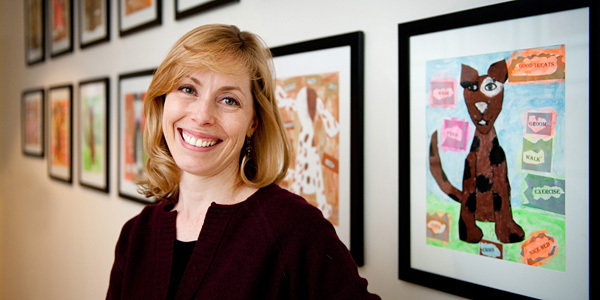Support From the Heart

Jeannine Moga understands how attached people become to their pets, especially when the kitty or doggie is dying or unwell. As the new client counselor for the Veterinary Health Complex in the College of Veterinary Medicine, Moga’s job is counseling pet owners who she sees as frequently overlooked when pets require care.
“Most people are surprised to have someone here whose job it is to take care of them,” she says. “Yet people who face losing an animal are stunned by how challenging it is. They say, ‘This is really hard,’—and it is.”
Social Work with Medicine
Moga’s free service is offered to pet owners before any major treatment. Moga says counseling pet owners is unique in that pets can be euthanized, pets can’t tell us what is wrong and within hours the cost of acute care can become exorbitant. So if a dog is hit by a car and needs emergency diagnosis, it could cost thousands of dollars just determining the extent of injuries.
“And that’s if things go smoothly,” she says. “So often I’m guiding clients whose decisions are based on a monetary basis.”

Part of her job is helping prepare families for ending a pet’s life. She helps establish payment plans and informs pet owners of any public assistance available. North Carolina is one of the few states with state and donor funds available for pet owners.
She also helps parents explain the concept of death to children. So when my sons and I realized recently our new pet bunnies had all succumbed to a flu, Moga would have explained to my distraught children (or asked me to explain) the cycle of life, and that death is universal and not reversible.
“It’s also good asking children how they want to say goodbye. Children ask a lot of questions so I suggest being as concrete as you can.”
The intersection between social work and veterinary work began 40 years ago and remains a small but growing trend. CVM is one of only 10 colleges in the country with a client counselor on staff. Moga began in October and already is training others to do similar work.
An Unexpected Career
Moga never predicted her current career. Yet when her favorite white-haired fox terrier was euthanized when she was 21, Moga was impressed by how caring her veterinarian and his daughter were towards her and her mother as they grieved.
“I felt cherished and cared for—but I knew not everyone had this experience.”
While her original career goal was working as a criminology professor, after reading sociology papers highlighting the human-animal bond, she knew she should pursue her master’s in social work instead.
Loving NC State
Moga loves working with a fascinating, interdisciplinary team dedicated to animals and within a teaching environment that appreciates discovery.
“This kind of environment is precisely where you would have a veterinary social work program,” she says proudly.
Moga already sees that many appreciate the service, and she frequently receives referrals. The 2012 data from the American Pet Products Association’s pet owners’ survey explains why. Three-quarters of American households have pets and 70 percent of dog owners and 60 percent of cat owners consider the animals to be like family.
“We must support the pets and their owners too,” she says.
- Categories:


